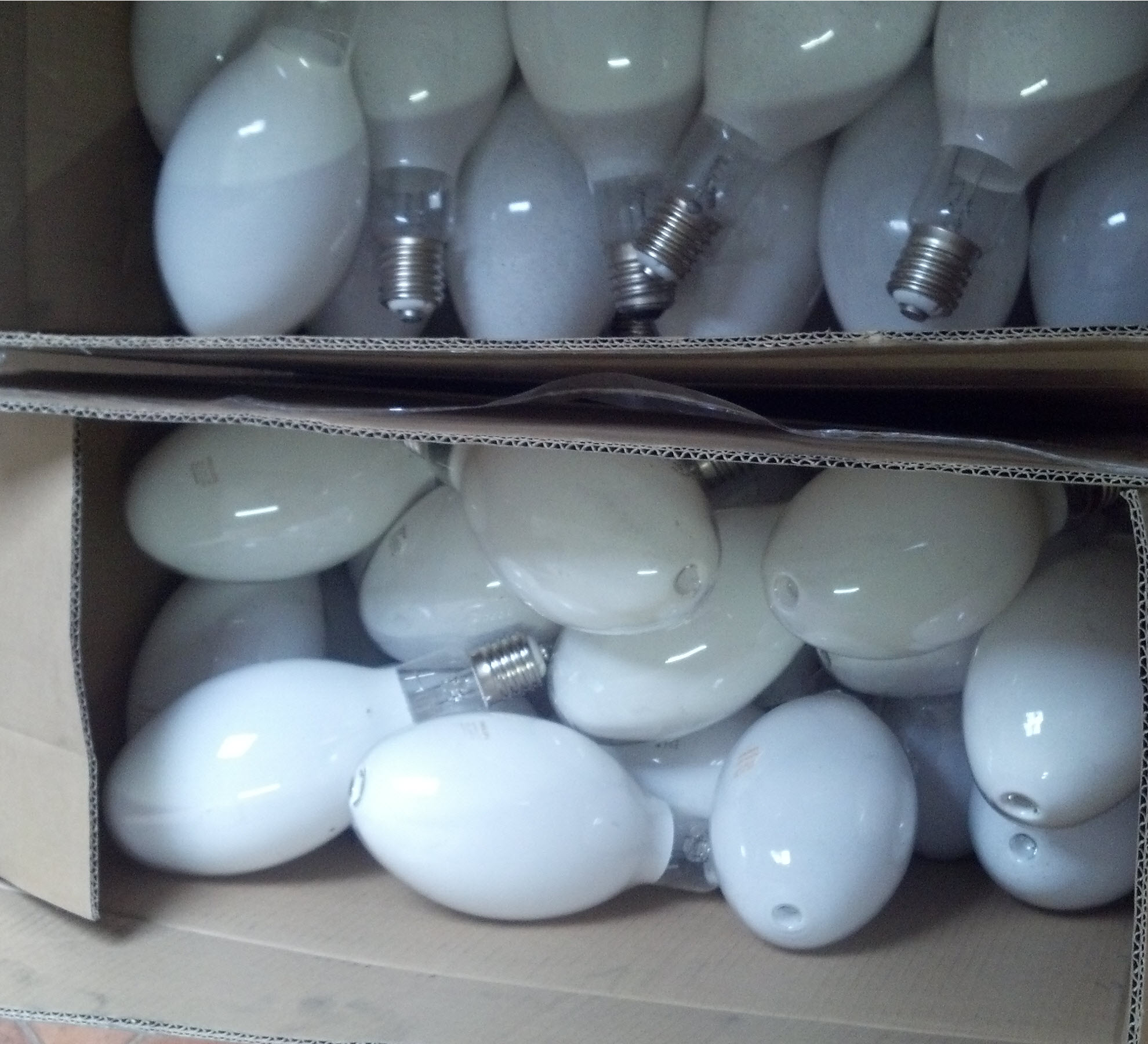Mecury vapour lamps are rubbish.
These high-bay mercury vapour lamps are heading for destruction (theirs, not Earth’s).

These boxes of mercury vapour lamps are being sent for destruction: specifically crushing and recovery of the glass, metal and (toxic) mercury, by specialist lamp recycler CMA Ecocycle.
So why destroy lamps which are still working?
The problem.
Most of the factories which Genesis Now assists to reduce the electricity costs of are lit with mercury vapour high intensity discharge lights, usually with metal ‘mixing bowl’ reflectors. Although this technology is the norm, it has a lot of short-comings:
- a very low efficacy of about 50 lumens / watt (when the lamps are new), compared with 100 – 130 from LEDs which are available now.
- continual worsening of efficacy (‘lumen depreciation’) while the lamps age in service,
- poor reflectance of the ‘reflector’, further degrading the overall lighting system performance,
- very poor vertical illumination (the lights act like down-lights, and although the horizontal illuminance readings on a light meter might look OK, real world visual tasks in factories and warehouses need good illumination of vertical surfaces.
- poor colour rendition, making some tasks difficult (e.g. colour matching, quality control).
- a long strike time (up to 10 minutes to reach full output), causing inconvenience and possible hazards when the lights are first switched on, and when the power is restored after a power failure.
- uneven light distribution, with ‘puddles’ of light directly under the fittings, and dark areas between the fittings, resulting in uniformity of 0.1 or lower (good practice is > 0.7).
- perceptible flicker, which causes discomfort, and headaches for some people.
- not being suited to switching more than a few times per day, which makes it incompatible with automatic switching systems (another hit to energy efficiency).
- inability to be dimmed, and so not suited to automatic dimming systems.
- containing a large amount of mercury, which is a neuro-toxin, and creates a hazard to staff and the general community if the lamps are accidentally broken or not disposed of properly.
- high operating current, and higher in-rush starting current, which can tip some circuit breakers and electricity supplies over their rated capacity.
The solution.
The solution lies in modern LED light fittings, with integral occupancy and daylight sensing, and automatic dimming and switching.
Suitable fittings are available in high-bay fittings, suited to open factory areas, warehouse aisles, and even workstation task lights.
The advantages of these fittings include:
- overcoming all of the shortcomings of mercury vapour lights, listed above,
- attracting a cash rebate, by generating Victorian Energy Efficiency Certificates (VEECs).
- providing a very visible example of a business’ commitment to its future, to modernisation and to environmental responsibility, to staff and visitors.
For the project that resulted in the two boxes of mercury vapour lamps shown on this page, the figures were even better than usual, because the warehouse operates 24 / 7 :
| Lights | power | Number | total power | Operating time | usage Factor | Annual Consumption (kWh) | Energy Cost | Invest | RoI | CO₂ |
| kW each | lights | kW | hours / year | kWh / year | $ / year | $ | % | tonnes /year | ||
| Before: MV high bays | 0.465 | 65 | 30.2 | 8700 | 1.00 | 262,958 | $ 39,444 | 352.4 | ||
| After: LED high bays, 1 min dwell, 10% residual light |
0.140 | 49 | 6.9 | 8700 | 0.25 | 14,921 | $ 2,238 | $ 44,100 | 84% | 20.0 |
| Change | 23.4 | 248,037 | $ 37,206 | 332.4 |
We’re here to help.
We have helped many businesses to select and install appropriate, efficient, cost-effective lighting, and to obtain a cash rebate.
For larger projects, we can also arrange financing, so the improved lighting and improved working environment can be funded from the improved cash flow resulting from lower electricity costs.
Call us to discuss your goals and ideas. Contact us.
